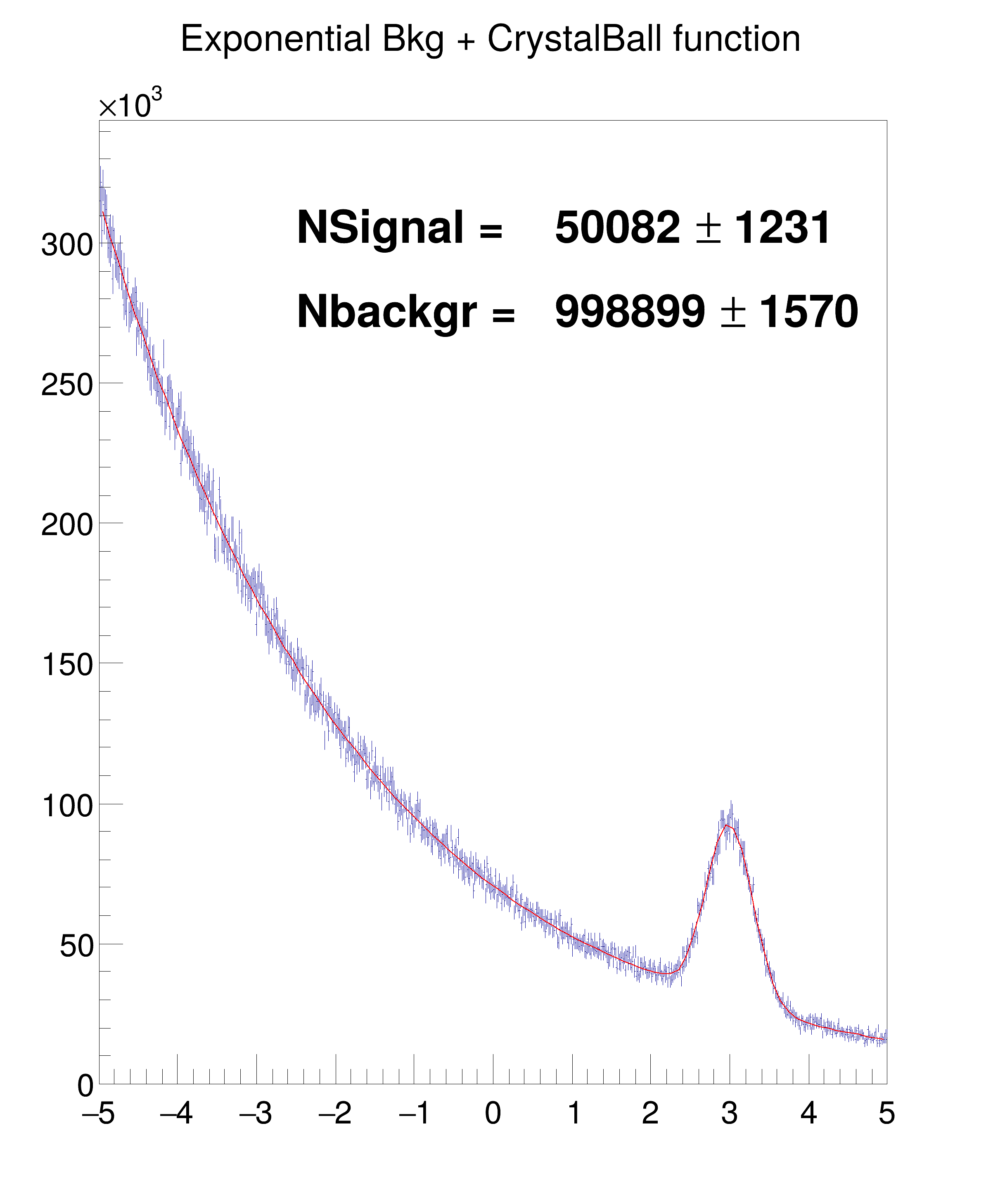

Tutorial for normalized sum of two functions Here: a background exponential and a crystalball function Parameters can be set:
- with the TF1 object before adding the function (for 3) and 4))
- with the TF1NormSum object (first two are the coefficients, then the non constant parameters)
- with the TF1 object after adding the function
Sum can be constructed by:
- by a string containing the names of the functions and/or the coefficient in front
- by a string containg formulas like expo, gaus...
- by the list of functions and coefficients (which are 1 by default)
- by a std::vector for functions and coefficients
Time to generate 1050000 events: Real time 0:00:00, CP time 0.090
****************************************
Minimizer is Minuit2 / Migrad
Chi2 = 1018.73
NDf = 993
Edm = 9.65559e-06
NCalls = 233
NSignal = 50082 +/- 1231.21
NBackground = 998899 +/- 1569.86
Mean = 2.99896 +/- 0.0022426
Sigma = 0.297871 +/- 0.00230279
Alpha = 2.12493 +/- 0.1368
N = 1.1562 +/- 0.468136
Slope = -0.300341 +/- 0.000644187
Time to fit using ROOT TF1Normsum: Real time 0:00:00, CP time 0.090
void fitNormSum()
{
TF1 *
f_cb =
new TF1(
"MyCrystalBall",
"crystalball", -5., 5.);
TF1 *
f_exp =
new TF1(
"MyExponential",
"expo", -5., 5.);
f_exp->SetParameters(1., -0.3);
f_sum->SetParName(1,
"NBackground");
f_sum->SetParName(0,
"NSignal");
for (
int i = 2; i <
f_sum->GetNpar(); ++i)
TH1D *
h_sum =
new TH1D(
"h_ExpCB",
"Exponential Bkg + CrystalBall function", nBins, -5., 5.);
h_sum->FillRandom(
"fsum", nEvents);
printf(
"Time to generate %d events: ", nEvents);
h_sum->Scale(1.,
"width");
new TCanvas(
"Fit",
"Fit", 800, 1000);
printf(
"Time to fit using ROOT TF1Normsum: ");
for (
unsigned int i = 0; i <
pref.size(); ++i) {
Error(
"testFitNormSum",
"Difference found in fitted %s - difference is %g sigma",
f_sum->GetParName(i),
}
}
ROOT::Detail::TRangeCast< T, true > TRangeDynCast
TRangeDynCast is an adapter class that allows the typed iteration through a TCollection.
void Error(const char *location, const char *msgfmt,...)
Use this function in case an error occurred.
Option_t Option_t TPoint TPoint const char GetTextMagnitude GetFillStyle GetLineColor GetLineWidth GetMarkerStyle GetTextAlign GetTextColor GetTextSize void char Point_t Rectangle_t WindowAttributes_t Float_t Float_t Float_t Int_t Int_t UInt_t UInt_t Rectangle_t result
R__EXTERN TStyle * gStyle
static void SetDefaultMinimizer(const char *type, const char *algo=nullptr)
Set the default Minimizer type and corresponding algorithms.
Class adding two functions: c1*f1+c2*f2.
1-D histogram with a double per channel (see TH1 documentation)
To draw Mathematical Formula.
static TString Format(const char *fmt,...)
Static method which formats a string using a printf style format descriptor and return a TString.
void SetOptStat(Int_t stat=1)
The type of information printed in the histogram statistics box can be selected via the parameter mod...
Bool_t AreEqualAbs(Double_t af, Double_t bf, Double_t epsilon)
Comparing floating points.
- Author
- Lorenzo Moneta
Definition in file fitNormSum.C.


